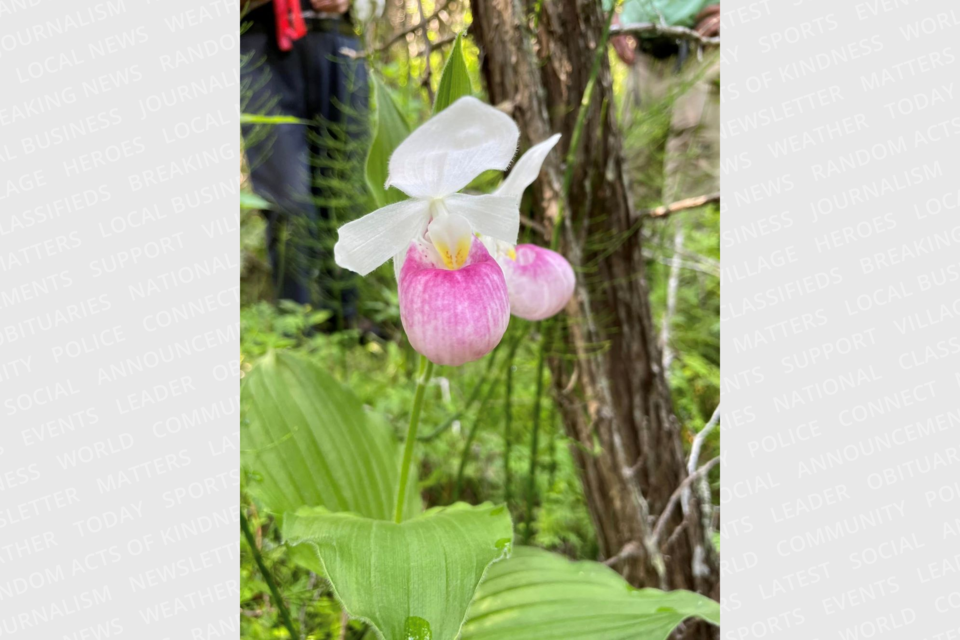A determined group of naturalists spent the day last Saturday searching the woods in a marshy area near the Sault — for slippers.
Not the kind you step on but the kind you admire: lady's slippers. Lady’s slipper (subfamily Cypripedioideae), also called lady slipper or slipper orchid, is a subfamily of five genera of orchids (family Orchidaceae) and, on Canada Day members of the Sault Naturalists were looking for a particular lady's slipper, the showy lady slipper (Cypripedium reginae).
The Sault Naturalists, founded in 1954, is an international club based in the twin Saults and it is affiliated with Ontario Nature.
Their excursions take members and non-members out year-round on water or land in Algoma and the Upper Peninsula.
Sometimes those excursions have a purpose other than to explore and enjoy the sights, sounds and smells of natural areas.
The purpose of the Canada Day excursion was to count and tag the location of every showy lady slipper group members could find in the first delicate step of a plan to conserve the beautiful flower.
"The club objectives are to provide members with a common meeting ground for exchanging ideas and for broadening their knowledge and understanding of natural science; to promote the appreciation, preservation, and conservation of our natural heritage; and to support and co-operate with other organizations having similar aims," said club president Ron Prickett. "The club is active in environmental advocacy, stewardship, and education and has participated in planning for national and provincial parks."
Conservation of the showy lady slipper fulfills several of the group's mandates including stewardship, conservation of natural heritage and cooperation with other area groups engaged in the effort to save and protect the orchids.
"Larger plants and shrubs are growing in the area around them and shading them out," said Val Walker, outings chair for Sault Naturalists.
The groups working together to protect the sun-loving, delicate lady's slippers plan to selectively and carefully remove some of the overgrowth to open up the habitat to more direct sunlight for the flowers.
The Sault Naturalists is now sitting at 202 memberships, (292 members) whose interests range from birds, wildlife and habitat to plants, trees and wetlands as well as hiking, cycling, snowshoeing, kayaking and canoeing.
The very active group organizes outings and events in partnership with other groups such as Clean North, Sault Ste. Marie Trails Advocacy, Algoma Highlands Conservancy and the Kensington Conservancy.
Sometimes those outings are organized to map invasive species so they and other groups can return and remove them. Those can be anything from Himalayan balsam to purple loostrife or the dreaded giant hogweed.
Excursions can last for several days or just a day and involve kayaking, canoeing, or snowshoeing, depending on the season.
"Both members and non-members can attend outings, although we will encourage non-members to join," said Renee Wysynski, membership coordinator.
Memberships are $25 a year for individuals, $30 for families and $10 for students, she added.
"We have some lifetime members at $250 each," Wynsynski said.
A portion of membership fees goes to support projects and environmental activism. Members can attend outings and monthly programs as well.
A recent program included a presentation from Abby Obenchain, communications lead for Clean North and the author of the recently released Sault/Algoma Grow Me Instead Guide. She talked about how Clean North is empowering people to green our world one action at a time.
In April and May, the Sault Naturalists worked with the City of Sault Ste. Marie and the Sault Ste. Marie Region Conservation Authority to compete with more than 450 other cities in the 2023 Nature Competition.
Thirty-six people participated in the event in Sault Ste. Marie which ran from April 28 to May 1. They made 656 observations of 221 species of wild plants and animals.
The Sault Naturalists are also continuing to work with the city to make Sault Ste. Marie, Ontario, a bird-friendly city. It's a program organized by Nature Canada in response to dropping bird populations in cities across the country.
"In the last 50 years, North American bird populations have dropped by more than 25 per cent," says the website. "Three billion of our birds, including common species that live in our towns and cities, are gone. This is massive."
The naturalists want to work with the city and Nature Canada to reverse this trend with coordinated, science-backed action.
As stewards of the viewing platform in Echo Bay, the group rebuilt the platform and constructed a boardwalk to access it even in times of high water and they have other projects on their long to-do list.
To learn more about the group, visit its webpage.
